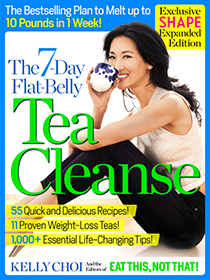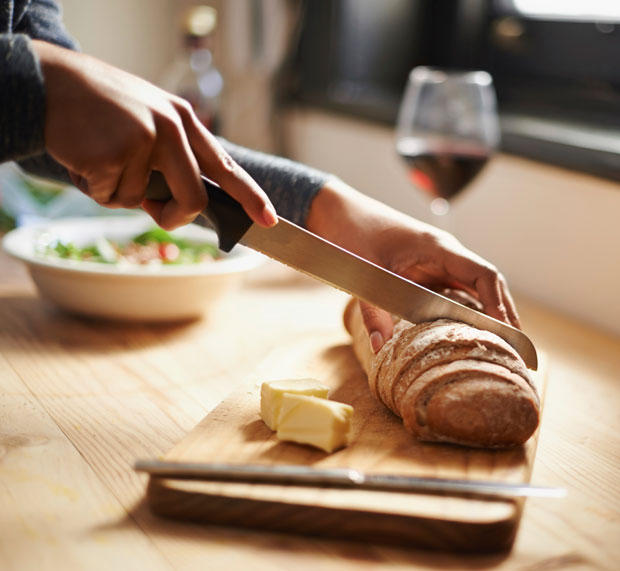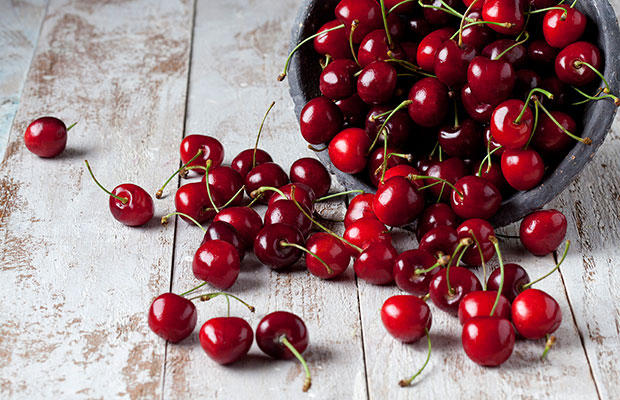How to Diet to Lose Weight as a Teenage Girl
Many teenagers want to lose weight but don't know how to. Often times when somebody (anybody) diets, they follow popular fads but aren't aware that those diets are unhealthy. As a teenager, you should know not to take diet pills or starve yourself. Dieting the healthy way can be difficult, but can definitely be done.
Steps
- 1 Know what dieting actually is. Dieting is not only related to food, despite popular belief. Exercise is necessary too, and it's a way of burning your calories instead of eating barely any at all. Dieting also takes self control which can be extremely challenging sometimes.
- 2 Before dieting, calculate your BMI. BMI is your body mass index, calculating your weight and the amount of fat you have. If yours is higher than average, you may be over weight or have big/strong muscles, because muscle weighs more than fat. If you're lower than average, than means you're usually underweight. However, your BMI isn't always accurate so don't freak out. If your body mass index is normal, you probably don't need to diet. But everybody who's in the normal range wants to get rid of that extra belly fat. That's okay, you just need to know when you're going to lose too much weight if you're dieting continuously. After, the goal is to maintain your weight.
- 3 Establish your goals. Are you trying to lose weight? If not, why? What do you want your final weight to be? Make a realistic goal, and not one that jeopardizes your health. Write them down to remind you of your goal, and you'll be more likely to stick to it.
-
4
Know what you nutrients you need to eat, and what foods or drinks are good sources for them. (This does not mention all of the nutrients you need exactly, as this does not mention Vitamin B-12, Vitamin A, Vitamin C, Vitamin D, Vitamin E, Vitamin K, Zinc, Thiamin, Selenium, Riboflavin, Magnesium, Lipids, and Folate.)
-
Carbohydrates ~ There are many misconceptions about carbohydrates. Everybody tries to avoid carbohydrates but, in actuality, they are the main source of energy for your body. Without carbohydrates, you will be on the road to hydration and the breaking down of protein. Also your body cannot function properly and it's necessary for physical activity. Aim for around 100 grams of carbohydrates a day. It varies depending upon your age though. Great sources of carbohydrates are:
- 100% Whole Grains such as whole wheat bread, whole grain cereals like Kashi (you can also look for a white check mark on any cereal box) and Fiber One.
- Medium-grain brown rice (Add some vegetables to your rice!)
- Vegetables
- Peanuts
- Fruits and vegetables (You can eat fruits with cereal and oatmeal)
- Oatmeal
-
Calcium ~ Calcium makes up 99% of your bones, including teeth. It's necessary for the growth, strength, and health of your bones. Great sources of calcium are:
- Dairy products such as milk, yogurt and cheese.
- Green vegetables like cabbage, broccoli, and black eyed peas.
- Sardines
- Tofu
- Energy, known as calories to most. They maintain your normal bodily functions. Extra calories are often stored as fat, though. This is why if you're trying to lose weight you want to limit your intake of calories. The trick is to burn more calories than you consume, which is where exercise comes in. If you burn less calories during the day than you consume, that's when you start to gain weight. A huge lack of calories can result in your starvation or death. The required amount of calories is different for every person. To find out, you can try using a calorie calculator.
-
Fiber ~ Fiber is incredibly important in your diet. It can help reduce the possibility of getting cancer, diabetes, and heart disease. Great sources of fiber are:
- Oatmeal
- Nuts (Especially almonds, walnuts and pecans!)
- Vegetables
- Popcorn (Popcorn is actually one of the healthiest snacks you can have when it is without any butter or other things added to it.)
- Whole grains
-
Iodine ~ Iodine is important, and needed for the function in almost all parts of your body. This is because Iodine makes Thyroid hormones (if you would like, you can look up why those hormones are so important). Iodine helps us to be able to think, maintain our body weight, and also helps to give us energy! Foods that are high iodine are:
- Iodized salt - This is the most basic way to gain the correct levels of iodine needed. However, too much salt is never a good thing.
- Milk
- Seafood
- Eggs (Boiled eggs with salt are awesome.)
-
Iron ~ Iron is also incredibly important to the body, and people with iron deficiency are required to take iron. Iron brings oxygen throughout your body. Without enough iron, you can become anemic and your red blood cells wouldn't be able carry enough oxygen. Foods high in iron are:
- Egg yolk
- Dark green vegetables
- Liver (Especially duck liver! This may seem kind of gross to some.)
- Roasted pumpkin seeds
-
Protein ~ Protein is incredibly important and an excessive lack of protein can result in the break down of body tissues, weaken your heart, and stunt your growth. Protein builds up your muscles and your bones. Great sources of protein are:
- Dairy
- Eggs
- Milk
- Seafood
- Beans
- Walnuts
-
Potassium ~ Potassium maintains blood pressure and without potassium, your nervous system could not function properly and is important in transmitting your nerve impulses for muscle contractions. Foods high in potassium are:
- Bananas
- Potatoes
- Milk
- Haddock
- Tomato juice
- Soy beans
-
Sodium ~ Sodium is important in fluid distribution throughout your body, electrical activity and your blood pressure. Too much sodium and too little can have consequential results. Sodium is found in almost everything you eat, and even in water! Some best sources of sodium are:
- Table salt
- Baking soda and baking powder
- Salami
- Cheese
- Crab (saltwater)
-
Carbohydrates ~ There are many misconceptions about carbohydrates. Everybody tries to avoid carbohydrates but, in actuality, they are the main source of energy for your body. Without carbohydrates, you will be on the road to hydration and the breaking down of protein. Also your body cannot function properly and it's necessary for physical activity. Aim for around 100 grams of carbohydrates a day. It varies depending upon your age though. Great sources of carbohydrates are:
- 5 Why do you need to know this? Because when you're dieting, you have to keep in mind you still need these nutrients in your diet. Use some of these foods and figure out how to incorporate them into your diet. For example, put some iodized salt on a hard boiled egg, have a chicken salad with a glass of milk. For breakfast, you could have some oatmeal with fresh fruit on it, or a milk shake with ice, milk, protein powder, add some blueberries or strawberries. There are tons of ways to combine these nutrients into great tasting foods.
- 6 You have to drink a lot of water when you're dieting. Water makes up almost 70% of your body! Therefore water serves many functions. It helps your digestion, prevents dizziness and dehydration. Water decreases your appetite, and it's actually not possible to lose weight without drinking a lot of water.
- 7 Watch out for dehydration. Dehydration can cause dizziness, fatigue, loss of concentration and with severe dehydration, it's possible to die. This isn't supposed to scare you, it's fact. To tell if you're dehydrated, your pee will be dark yellow. Also, when you stick out your tongue, it will have that pasty white stuff on it if you're dehydrated.
- 8 Swap the foods you eat for a healthier option. Instead of sugary cereals, replace it with raisin bran. Instead of using sugar, use Splenda. Instead of eating white bread, eat whole wheat bread. Instead of drinking soda like Sprite (even Diet Sprite isn't too healthy), have a Sprite by Weight Watchers. You can search online and find tons of alternatives to the foods you love.
-
9
Breakfast is the most important part of the day. Everybody has heard that! Never skip breakfast. It's a common misconception that skipping meals will help, which includes breakfast. In fact, a study has shown that skipping breakfast has negative outcomes, not positive. Kids are not as well focused in school and experience fatigue and lack of concentration. It helps maintain your weight, and helps you lose weight. There are tons of benefits from eating breakfast so make sure you don't skip, and eat something healthy. It keeps you going until lunch time. There's a saying, "Eat breakfast like a king, lunch like a prince, and dinner like a peasant." Breakfast should be your biggest meal, while all your other meals of the day should be on the small side. These are a couple breakfast possibilities:
- Whole grain cereal that's high in fiber with some fruit. A cup of milk (if you like milk), or a cup of yogurt. (The mini packaged ones.)
- Grapefruit with Splenda, some cheese (separately, of course), and bring a couple walnuts with you to school. At least one cup of water.
- Oatmeal (Instant oatmeal is best if you don't have much time in the morning.) with fresh fruit on it (like blueberries, cut strawberries, and raspberries). You could have small smoothie too. (Like a strawberry smoothie.)
- Yogurt with some granola and fruit. (Water, too, of course.)
- Apples with peanut butter with a piece of toast.
- 10 For lunch, you might eat the school food. However it's usually not the healthiest food in the world (but not necessarily). The best solution is to bring your lunch to school. Prepare it the night before so you're not rushing to pack it in the morning.
- 11 Once you've eaten your food, before going back for more, ask yourself a question. Are you really still hungry? Most people get seconds when they're full, but their body hasn't registered it yet. Have you drank any water? If not, have a cup or two of water and then reconsider getting more food. Many people mistake thirst for hunger. Yes, water fills you up just as much as food. Have you ever noticed, when you drink a lot of water, you're all of a sudden full and food would be the last thing on your mind? Probably. When people eat more food than they should, that's when they gain weight, so be weary of that!
- 12 Use smaller plates. When you fill your whole plate with food, you're likely to eat all of it, even if you shouldn't. If you use smaller plates, you know you won't be over eating. If you were over eating before, you may seem to feel hungry more. Within a couple days, your body will adjust.
-
13
When eating packaged foods, look at the nutrition label. The percentages beside each nutrient is based on a 2,000 calorie diet. There are many things to look for. Look for:
- Serving sizes
- Number of servings
- Calorie count
- Calories from fat
- Total amount of fat
- Amount of saturated fat
- Fiber
- Sugars
- Protein
- 14 It's important to know which nutrients outweigh the bad ones, and how to read a nutrition label. It's almost always measured as grams and percentage of your daily value. It's always based off a 2000 calorie diet so never assume that's the exact amount you need. Different people need to eat different amounts of calories. There's a "five finger rule", where if there's 10% or more of positive nutrients like fiber, protein, vitamin C, Calcium, Vitamin A etc., you put one finger up and if there's more than five, it's good to eat. However, every time there's more than 10% of a bad nutrient, you put a finger down. If you still have one or two fingers up, than it's on the healthier side. You put a finger down if it has more than 200 calories per serving (but this varies depending on the food).
-
15
Exercise. Exercise is one of the most important parts of a diet and losing weight. Exercise burns calories, and calories are what you depend on to get you through the day. Because calories are often stored as fat, you need to burn more calories than you consume, therefore losing the stored fat. You can't just lose weight magically, it takes real effort. Some great ways to lose calories are:
- Bike riding.
- Start doing a sport like soccer, basketball, swimming, or lacrosse.
- Jumping rope.
- Walking your pet everyday.
- Walk everywhere that's within walking distance.
- 16 When ordering food in a restaurant, try to choose the smallest portion size that will satisfy you. Keep in mind that in addition to eating healthily, you're going to be eating less, but not to the extent it's unhealthy; that's what dieting includes (in case you forgot).
-
17
Remember the food plate. Recently, they changed the food pyramid to the food plate. The food plate shows about how much space on your plate each food group should take up. The five food groups are:
- Vegetables
- Grains
- Fruits
- Dairy
- Protein foods
- 18 Learn to incorporate all of them into your diet. Obviously you won't necessarily be able to eat the perfect amount of the food groups everyday, as not many people can. Especially because you're dieting; but you can fit at least a little of each food group into your day.
- 19 Almost everything is okay to eat, but in moderation. You can overeat anything which is unhealthy. If it's a food that's good for you, eating too much is still a bad thing. For example, if you drink too much water, you will experience water intoxication. It lowers the amount of sodium in your system through osmosis and excessive amounts of water fills the cells and they could almost reach the point where they could burst.
-
Easy Tips To Lose Weight And Keep It Off
TIP! When you are trying to lose weight, cut down on the amou
-
10 Things Only Someone Whos Trying To Lose Weight Understands
Maybe youre trying to drop those last stubborn 10 pounds. Maybe your d
-
Lose Weight Quickly 'Guaranteed': Is It A Scam?
When people want to lose quickly, if they see a ‘guarante
-
How to Plan a Weight Gain Diet Cheaply
Need to gain weight? Whether you are trying to gain weight to build m
-
Feel Completely Awesome In 28 Days (Or Less!)
Freaking January. It's that time when you push yourself to do hard
-
Frustrated At Your Weight-Loss Efforts? Read Here!
TIP! Exercise is a huge part of losing weight. Despite popula
- DON'T MISS
- Meridia Weight Loss Pills pulled off the Market
- What is circuit training
- Weight loss is a HOT subject
- Lose Weight Easier With These Great Tips
- The Easy Way To Burn More Fat
- How to Lose Weight in 4 Months
- Thoughts on Biggest Loser Couples Season 11 Premiere
- 11 Things Women Whove Lost 50+ Pounds Want You To Know
- Weight Loss Tips You Can Count On
- Great Steps On How To Prevent The Loss Of Hair




